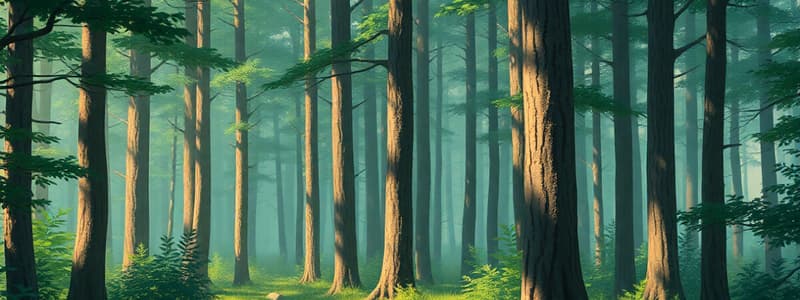Podcast
Questions and Answers
The forest has four layers: forest floor, under-storey, canopy, and ______.Emergent
The forest has four layers: forest floor, under-storey, canopy, and ______.Emergent
emergent
The ______ layer is found between the canopy and the forest floor.
The ______ layer is found between the canopy and the forest floor.
understorey
In Nigeria, the two broad belts of vegetation types are forest and ______.
In Nigeria, the two broad belts of vegetation types are forest and ______.
savanna
The forest zone in Nigeria is subdivided into saline water swamp, freshwater swamp, and ______ rainforest.
The forest zone in Nigeria is subdivided into saline water swamp, freshwater swamp, and ______ rainforest.
The ______ layer of the forest receives the highest sunlight, temperatures, wind, and rain.
The ______ layer of the forest receives the highest sunlight, temperatures, wind, and rain.
Normal Forest serves as a standard for comparison of an actual forest estate to identify its deficiencies for purposes of sustained ______ management.
Normal Forest serves as a standard for comparison of an actual forest estate to identify its deficiencies for purposes of sustained ______ management.
A forest that contains a regular and complete succession of age-gradations or classes results in an equalization of the annual or periodic ______ of mature woods.
A forest that contains a regular and complete succession of age-gradations or classes results in an equalization of the annual or periodic ______ of mature woods.
Normal Forest is ideally constituted regarding growing stock, age class distribution, and ______.
Normal Forest is ideally constituted regarding growing stock, age class distribution, and ______.
The concept of Normal Forest involves a sustained yield management where trees are harvested at ______ age and replaced by new trees.
The concept of Normal Forest involves a sustained yield management where trees are harvested at ______ age and replaced by new trees.
A normal forest maintains a practically attainable degree of perfection in all its parts for the full satisfaction of ______.
A normal forest maintains a practically attainable degree of perfection in all its parts for the full satisfaction of ______.
Flashcards
Normal Forest
Normal Forest
An ideal state of a forest where all age classes of trees are represented in the correct proportion, ensuring a consistent yield of timber each year without jeopardizing future harvests.
Sustained Yield Management
Sustained Yield Management
The principle of managing a forest in such a way that allows for harvesting trees at maturity and replacing them with new trees, ensuring a continuous supply of timber without depleting the forest.
Rotation Age
Rotation Age
The time period between planting a tree and harvesting it for timber, ensuring a continuous cycle of tree growth and regeneration.
Age-Gradations or Age Classes
Age-Gradations or Age Classes
Signup and view all the flashcards
Annual Yield
Annual Yield
Signup and view all the flashcards
Forest Floor
Forest Floor
Signup and view all the flashcards
Understorey
Understorey
Signup and view all the flashcards
Canopy Layer
Canopy Layer
Signup and view all the flashcards
Emergent Layer
Emergent Layer
Signup and view all the flashcards
Vegetation
Vegetation
Signup and view all the flashcards
Study Notes
Normal Forest Concept
- Normal forest is an ideal forest condition, used as a standard for comparing actual forests, highlighting deficiencies for sustainable yield management
- Normality represents an achievable level of perfection in a forest, maintained perpetually
- A normal forest has a regular, complete succession of age classes in correct proportion
- Annual or periodic felling of mature trees results in equalizing annual yields
- Growing stock is distributed by size and age classes, providing nearly equal annual volumes through growth
Sustained Yield Management
- Aims to manage trees in forests such that trees are harvested at maturity, replaced naturally or artificially, ensuring mature trees are always available
- In normal forests, a forest is considered normal when it exhibits a normal series of age classes, normal increment, and consequently, normal growing stock
Forest Formation Layers
- Forest has four main layers: forest floor, understory, canopy, and emergent
- Forest floor: Humid (95% RH), stable temperature (25-30°C), receives little light, rainwater collects at the base of trees, seeds lie dormant waiting for optimal conditions to sprout.
- Understory: Layer between canopy and forest floor, shrubs and small trees grow here, limiting sunlight and rainfall compared to other layers
- Canopy: Layer formed by trees that shelter the understory below, animals, insects, birds, and bats are common
- Emergent layer: Tallest and oldest trees, reach above canopy, bear brunt of weather changes (e.g., extreme sunlight, highest temperatures, wind and rain)
Nigeria's Vegetation Zones
- Nigerian vegetation is categorized by West-East zoning, reflecting climate and rainfall patterns
- Major zones are forest and savanna, with mountain vegetation in isolated areas
- Forest zones include: saline water swamp, freshwater swamp, tropical evergreen rainforest, subdivided by conditions like saline water mixes with freshwater
Biodiversity Conservation
- Biodiversity conservation is the sustainable use of biological resources, including exploitation and protection
- Importance of conservation includes:
- Biological resources (medicine, food, wood products, fibers)
- Ecosystem services (e.g. pollination, decomposition, water purification, flood moderation)
- Social (e.g., ecotourism, support of local cultures)
- Spiritual benefits (protecting nature for spiritual significance)
- Education and research
- Aesthetics and environmental amelioration
Studying That Suits You
Use AI to generate personalized quizzes and flashcards to suit your learning preferences.





